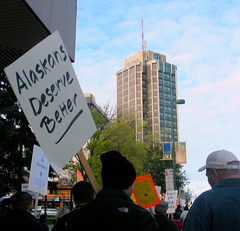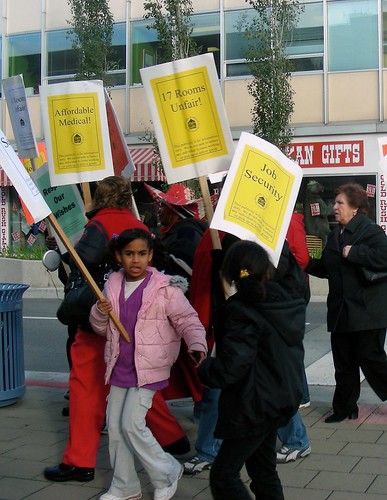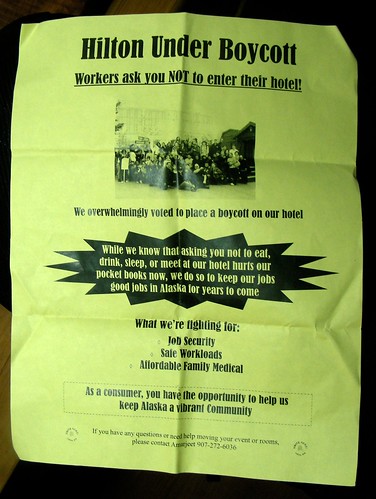| Crossposted at Celtic Diva’s Blue Oasis |
UNITE HERE Local 878 represents workers at several Anchorage hotels including about 200 at the Anchorage Hilton. Hilton workers have been fighting for a fair contract since August 2008, when their last contract expired. But Kentucky-based Columbia Sussex, which took over the Anchorage Hilton in 2006, has been dragging its feet as much as it can, while simultaneously imposing — unilaterally — new demands on the workers, including increased workloads without additional pay.
It’s a national pattern with Columbia Sussex. For example, workers at the City Center Sheraton in Baltimore, which Columbia Sussex acquired in 2005, have been without a contract since April 2006. [Ref #1] Pressed by unilateral changes in work conditions, work speedups, management incompetence, and other problems brought on by Columbia Sussex’s policies, Baltimore workers — members of UNITE HERE Local 7 — put the hotel under boycott on November 15, 2007. [Ref #2] It’s still under boycott, [Ref #3] despite reportedly millions of dollars in revenue losses due to the boycott. [Ref #1] According to one piece about the Baltimore boycott,
The owner of Columbia Sussex, Bill Yung, has been slashing at wages, healthcare, and pensions while increasing workloads. He has been quoted as claiming his only interest is “making money,” and has made vows never to sign union contracts. The hospitality industry is the second fastest growing industry in Baltimore, so for the sake of this city it is vital that profiteers like Yung be driven out or forced to give workers good jobs, so that as this city grows, it grows in a positive direction. Yung’s model keeps workers struggling on the edge of poverty, and it is essential that we join together to stop this exploitative model. [Ref #1]
William J. Yung III, CEO of Columbia Sussex, has been operating much that way for a very long time. In an in-depth article about his disastrous entry into the casino business with Columbia Sussex subsidiary Tropicana Entertainment, Ben Fidler of TheDeal Magazine writes,
By the time Columbia Sussex purchased Aztar [owner of the Tropicana Casino & Resort in Atlantic City, among other properties], the company owned 70 hotels, which Yung had assembled through acquisitions in the ’70s and ’80s. Yung carved out a management style that could be successful in a certain kind of hotel: extracting significant cost savings, typically through extreme job reductions, says one source, who notes, “He cuts the work force down to the bone.” Under Yung, staffers were typically required to work longer hours for less money. “That’s how he distinguished himself in the hotel business,” says the source. [Ref #4]
Good for Yung’s profits, bad for its workers. And bad for the Tropicana in Atlantic City, too. Yung saved roughly $40 million in labor costs by laying off about 1,300 employees at the Tropicana AC, but at the cost of “roaches, bedbugs, dirty floors and overflowing garbage pails” [Ref #4] — not to mention surly, unhappy workers. [Ref #5] Thanks to Yung’s policies, its gaming license under New Jersey law came under threat:
Over and over again, evidence was introduced at the hearings about dirty conditions and poor service at the Tropicana, which has New Jersey’s largest hotel at 2,129 rooms.
A Denver association of environmental health officials, for example, is refusing to pay the last $22,000 of its $97,000 bill, citing 15 pages of complaints ranging from cockroaches and bedbugs to filthy rooms to rude and hostile staff, and even one cleaning woman who ate a guest’s room service meal when he stepped out for a moment. [Ref #5]
The Tropicana AC lost its gaming license, and Yung was ousted from the management and board of Tropicana Entertainment LLC. [Ref #4]
But he still has Columbia Sussex, and he still has his hotels. And his policies are what workers at the Hilton Anchorage are dealing with. For example, changes in working conditions. In June, shortly after Hilton workers called for a boycott of their employer, Brendan Joel Kelley of the Anchorage Press explained,
Meanwhile, according to Daniel Esparza from HERE, housekeeping employees are being asked to raise the number of rooms they clean in a shift from 15 to 17, and if employees don’t comply, they’re subject to disciplinary action: warnings, suspensions, and firing. “[Columbia Sussex] is going after the ones that are probably least able to defend themselves,” Beltrami says. “The hotel employee restaurant union, they represent a lot of the lower wage earners. So the housekeepers, a lot of them are minority women—most I would say—and they’re really trying to put it to them.” [Ref #6]
As I wrote a few days ago of the change from 15 to 17 rooms a day,
if you’ve ever cleaned a hotel or motel room, you know that’s imposing quite a bit more work for no additional compensation. [Ref #7]
It’s also a major health concern. In a study based on OSHA records for 87 hotels from 1999 to 2007, UNITE HERE found,
On average, hotel workers experienced an injury rate of 6.4 per 100 workers, meaning that, in each year, more than six percent of the hotel workforce in these hotels suffered a documented workplace injury. Hotel housekeepers, however, faced a significantly greater injury rate of 10.4%, which is 86% greater than the injury rate experienced by non-housekeepers (5.6%). [Ref #8, p. 8]
And the faster they are required to work — in order to meet higher housekeeping quotas imposed by employers — the higher the risk of injury:
In recent years, the workload that hotel companies demand housekeepers perform has increased significantly. Chronic understaffing, coupled with the addition of time-consuming amenities—luxury items like heavy mattresses, fragile coffeepots and in-room exercise equipment—have placed housekeepers at greater risk of injury. In order to complete their room quotas, housekeepers are increasingly forced to skip meals and other breaks—rests necessary to prevent injury. Today, housekeepers’ bodies are at the breaking point. [Ref #8, p. 4]
This is what the Hilton Anchorage management, on orders from Bill Yung and Columbia Sussex, are imposing on Hilton workers.
They don’t care. Not if it’s their profits at stake.
Obviously at least a few Anchorage residents don’t care either, based on many of the reader comments made on the brief story in the Anchorage Daily News about yesterday’s Hotel Workers Rising March from the Sheraton to the Hilton. Here’s a sampler:
I’m sure that some people would be happy to even have a job. I’d be bringing in the scabs. Not too hard to train hotel workers anyway, and then you’d have grateful employees.
Problem solved. (Guy_Smiley)
The signs should be expressing gratitude for having a job. (resnared)
Fire ’em all. Fire every single last one of them. No exceptions: everyone, terminated, there’s the door, you’re outa here.
Then, open up a job-hiring room in each hotel. Care to guess how long it would take to hire new workers, at the same wages as the ones who’ve been fired, with the provision that there’s no union mafia membership?
24 hours, if that. (DaphneFitzroy)
This would have been a magnificant [sic] opportunity for INS to make a sweep for ILLEGALS. (gman2)
Union advocates, you do yourselves and your “cause” no good by these actions. Claiming that “management” demands you put up with “unfair working conditions,” without offering even a shred of evidence just makes you appear silly.
Public sentiment is strongly against unions, and in our country’s current economic condition that sentiment is growing. As we’re all forced to tighten our belts, we don’t want to hear about your “demands.” If you want a better-paying job with more generous benefits, acquire the education and/or training necessary and take the initiative to find one. (CrosleyField)
The only question I have is……….. where was the INS they should have been checking green cards???? (bhessert)
If you don’t like your job…the management, the pay, the requirements, benefits, whatever, find another job. I cannot imagine making a career out of working for a hotel or motel anyway. Those are stepping-stone jobs while you gain a meaningful education on your way to a real job. (lnhbowlus)
In this economy, maybe people should be grateful they have a job at all….you can be replaced…. (FISH4GOODTIMES) [Ref #9, reader comments]
Many of the comments were products of what appeared to be universal hostility towards unions regardless of what kind of work its members did, how much they were paid, or whether their complaints had any merit. Many seemed to think that all workers had to do was to quit their jobs, get training, and go to new, better jobs — never mind that most workers had families they couldn’t afford to leave unprovided for as they went off to pursue educations that they couldn’t afford anyway without income. Many commenters made assumptions about the demands they were making without any effort to learn what Hilton workers were in fact demanding — and denying the facts even when other commenters (including me) provided them with documented information.
And then there’s this comment:
This dispute is over Physical Labor $11 hour to clean 17-20 rooms in an 8 hour shift. (estimate 25 minutes per room to handle the 17 room quota; an experience housekeeper possible 20 minutes to receive more rooms)
Job description: quickly vacuum, change the bedding, clean the bathroom, change out the towels, check the toilet paper dispenser, and complimentary items around the room. Plus pay a union dues each month. (stress occurs to the physical body due to physical labor)
I could understand a higher salary for construction workers who use physical stress & mental stress.
Or women who receive a higher salary for mental stress in a productive business.
As a single parent, I can accomplish more housekeeping work in 30 minutes inside my home, and be paid nothing for my accomplishment.
I understand the “cost of living” is expensive in Alaska.
It would of been appropriate to ask an Employer for a raise to get through difficult times instead of using a Union to miss a day of work. (JulianaSmithAK) [Ref #9, reader comment]
[Update 10/2/09: Interestingly, when I checked this morning, JulianaSmithAK’s note had been unnaccountably removed. So were other comments she’d made earlier in the comment stream on this story.]
Which just goes to show that JulianaSmithAK (1) apparently has not considered that even workers for an exploitative company like Columbia Sussex get time off — in fact, a lot of them seem to have more time off than before Yung’s company took over the company, because workers losing hours (and managers doing their work) is another of their complaints; and (2) has no concept of the physical demands actually placed on housekeeping staff in a luxury hotel like the Hilton:
“I have sharp pains when I bend,” says Leticia Ceballos, a hotel housekeeper at the Glendale Hilton near Los Angeles. “Putting the sheets on the beds and cleaning the toilets and bathtubs hurt the most. After the hotel put in the heavier beds and linens, the pain became more severe.”
The problem is getting worse as hotel companies implement room changes like heavier beds and duvets, triple sheets, extra pillows and in-room amenities like coffee makers and treadmills. The evidence strongly implicates increasingly excessive workloads in the rising rates of musculoskeletal disorders such as low back pain and tendonitis among hotel housekeepers. “This is among the highest-stress jobs (on the body) in the service and production industries,” occupational-medicine physician Peter Orris told USA Today. [Ref #10]
But hey, I guess it’s just easier to think about 30 minutes in one’s own house, and pretend that it duplicates the actual working conditions that housekeeping staff at the Hilton or other big hotels work under.
But I’d prefer to go by actual facts. And if those commenters at the Anchorage Daily News don’t give a damn about Hilton workers — I do.
I was proud to march with them yesterday. And I will continue to support their fight for a fair contract. I hope you will too.
References
- 4/12/09. “Mayday Rally: Support the Sheraton Workers!” (Red Emma’s Bookstore Coffeehouse).
- 11/13/08. “Boycott of Baltimore City Center Sheraton Hotel Launched by UNITE HERE!” by Flint Sparc (Baltimore IMC).
- “Union Hotel Guide: Boycott These Properties” (Hotel Workers Rising).
- 7/18/08. “Yung and the restless” by Ben Fidler (TheDeal Magazine).
- 12/1/07. “Tropicana faces challenge to undo damage to reputation” by D.J. McAneny (NJ.com).
- 6/17/09. “Housekeeping – The Hilton’s union employees institute a boycott” by Brendan Joel Kelley (Anchorage Press).
- 9/28/09. “Hotel Workers Rising March: September 30” by Melissa S. Green (Henkimaa).
- April 2006. Creating Luxury, Enduring Pain: How Hotel Work is Hurting Housekeepers (UNITE HERE). (Available through the Take Action page on the Hotel Workers Rising website.)
- 10/30/09. “Hotel workers hold downtown rally over wages, benefits” (Anchorage Daily News).
- Take Action page (Hotel Workers Rising).
Further background on the Hilton boycott:
- 9/25/09. “Unity & union-busting” by Melissa S. Green (Henkimaa).
- 9/28/09. “Hotel Workers Rising; Why We Need to Get Involved” by John Aronno (Alaska Commons).
Slideshow of Hotel Workers Rising March, Anchorage, September 30, 2009
Here’s the slide show of all the photos (or the ones I uploaded, anyway) of the march. You can view the slideshow full-screen by tapping the full-screen icon. You can also see the entire set in my Flickr photostream.













Pingback: Frozen Solidarity: a Pro-Labor Rally in Anchorage « the Alaska Commons